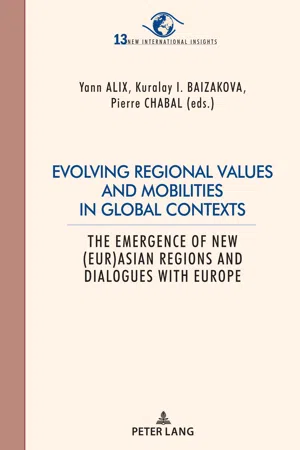
Evolving regional values and mobilities in global contexts
The emergence of new (Eur-)Asian regions and dialogues with Europe
- 372 pages
- English
- PDF
- Available on iOS & Android
Evolving regional values and mobilities in global contexts
The emergence of new (Eur-)Asian regions and dialogues with Europe
About This Book
This book analyses the gradual fusion of Europe and Asia into a Eurasian dynamic combining institutional and identity aspects. The seventh in a series of Europe–Asia conferences covering regime dynamics, cooperation policies, regional competition, the limits of regions, mutual understanding and cross-border exchanges, it shows that Eurasian continental developments are outgrowing sub-region designations such as Western Europe, Southeast Asia, East Asia and Central Asia.
Ten years ago, before the launch of the Belt and Road Initiative (BRI), regional dynamics seemed clearly delineated, especially with inter-state groupings mapping out space – the EU, the ASEAN, the Shanghai Cooperation Organisation (SCO) – and organisations overseeing pan-continental competition such as the Conference on Interaction and Confidence-building in Asia (CICA), the Eurasian Economic Union, etc. Today, the less institutional and more macro-economic scheme of an infrastructure and transport network coined as " China's BRI" changes the research environment.
Gathering about thirty scholars from a dozen Eurasian countries, this book contains views from East Asia (Mongolia, China), Central Asia (Kazakhstan, Kyrgyzstan), Western Europe (France, Belgium), Eastern Europe (Poland, Romania, Hungary, Turkey) and the Caucasus (Azerbaijan). Asia and Europe can no longer be understood except as Eurasian sub-entities. Multi-dimensionally, the book draws from history, international economic relations, politics, geography, economics, cultural studies, public and private law, business studies, peace and conflict studies, public administration, and even literary criticism to tackle the question: what is Eurasia?
Frequently asked questions
Information
Table of contents
- Cover
- Copyright information
- Table of contents
- Acknowledgements
- Preface
- General introduction
- Part I Regions as institutional constructs aimed at organising competition
- Part II The renewal of the competition of continental and maritime geopolitics
- Part III Regional identities and values in emerging (Eur)Asian dynamics
- Part IV European and Asian cooperation initiatives and reactions
- Postface
- Afterword
- List of contributors
- Series index